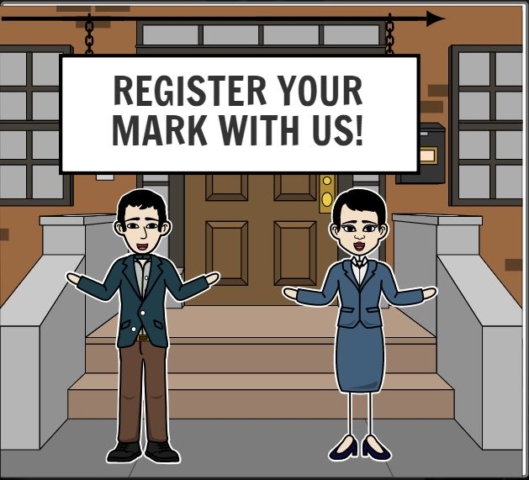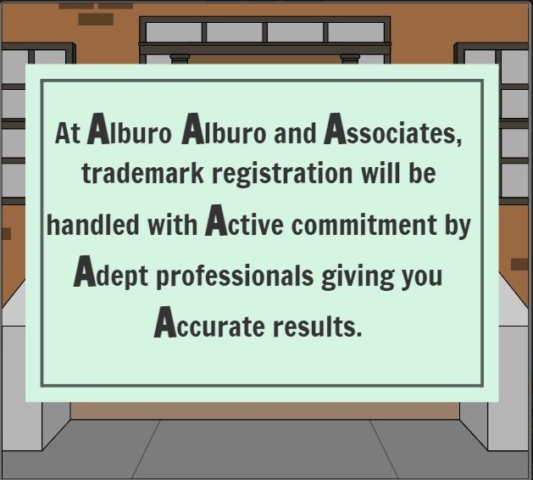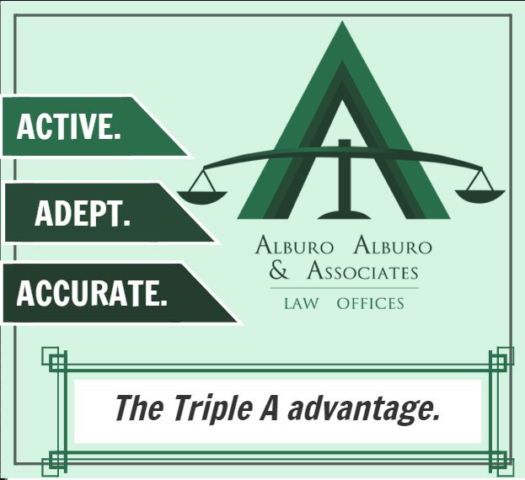(The following post does not create a lawyer-client relationship between Alburo Alburo and Associates Law Offices (or any of its lawyers) and the reader. It is still best for you to engage the services of your own lawyer to address your legal concerns, if any.
Also, the matters contained in the following were written in accordance with the law, rules, and jurisprudence prevailing at the time of writing and posting, and do not include any future developments on the subject matter under discussion.)
Q: What is a trademark?
A “mark” means any visible sign capable of distinguishing the goods (trademark) or services (service mark) of an enterprise and shall include a stamped or marked container of goods.
It is the distinctive mark of authenticity through which the merchandise of a particular producer or manufacturer (or service provider) may be distinguished from that of others, and its sole function is to designate distinctively the origin of the products to which it is attached [Arce Sons and Company vs. Selecta Biscuit Company, G.R. No. 14761, January 28, 1961].
Q: How are trademarks protected?
Protection over trademarks are acquired through registration with the Intellectual Property Office of the Philippines (“IPO”).
Q: What are the rights of an owner of a registered trademark?
The owner of a registered mark shall have the exclusive right to prevent all third parties from using in the course of trade such marks identical or similar to the registered trademark, where such use would result in a likelihood of confusion. In case of use of identical sign for identical goods or services, the likelihood of confusion shall be presumed.
The exclusive right of the owner of a well-known mark which is registered in the Philippines shall extend to goods and services which are not similar to those in respect of which the mark is registered, as long as the use of that mark in relation to unrelated goods or services would indicate a connection between those goods or services and the owner of the registered mark, and that the interests of the owner of the registered mark are likely to be damaged by such use.
In determining whether a mark is well-known internationally and in the Philippines, knowledge of the relevant sector of the public, rather than of the public at large, including knowledge in the Philippines obtained as a result of the promotion of the mark, shall be taken into consideration.
Q: What are the marks that cannot be registered?
1. Descriptive marks;
2. Misleading marks as to the nature, quality, characteristics or geographical origin of the goods;
3. Generic and customary to the trade;
4. Immoral, deceptive, and contrary to public order or morality;
5. Marks or signs consisting of names, portraits of persons;
6. Maps, flags, insignia, stamps, seals, crests, coat of arms and other political signs and symbols of national and international organizations, associations and institutions;
7. Shapes, when necessary by the nature of the goods;
8. Color alone unless it is defined by a given form;
9. Marks that could be identical or similar to prior registered marks;
10. Marks containing scandalous and disparaging material;
11. Marks constituting mere translation of well-known marks.
Q: What are the steps in registering a trademark?
a. Application, where a trademark owner submits his application for trademark registration;
b. Trademark search, where it will be checked whether a similar trademark already exists;
c. Examination, where a trademark examiner will check whether the application complies with rules and regulations, and to determine the registrability of a trademark being applied for registration;
d. Publication of the trademark in the IPO Gazette, to let the public become aware about the trademark under registration, for purposes of determining whether registration of the subject trademark is prejudicial to a trademark owned by another owner and opens the registration to possible opposition;
e. Registration, finally granting protection and exclusive rights to the trademark, which shall be good for a period of 10 years from date of registration;
f. Renewal, to be undertaken within 6 months before the expiration of the trademark registration.
Q: What if I do not use my trademark after I register it, what will happen?
Unless excused, non-use of a mark is a ground to cancel your trademark registration. Non-use of a mark may be excused if caused by circumstances arising independently of the will of the trademark owner. Lack of funds shall not excuse non-use of a mark.
Q: What can I use as proof that I am actually using my trademarks, for purposes of filing a Declaration of Actual Use.
1. Labels of the marks as actually used;
2. Packaging materials bearing the marks as actually used;
3. Photographs of the goods bearing the marks as actually used;
4. Brochures evidencing use of the marks in the Philippines;
5. Advertising materials evidencing use of the marks in the Philippines;
6. Downloaded pages from a website (of the company or under the control of the company) clearly showing that goods are being sold in the Philippines;
7. For online sale, receipts of sale of goods or other similar evidence of use, showing that the goods are placed on the market, or that a sale transaction took place in the Philippines.
Q: How long is the duration of registration of a trademark?
Trademark registration shall be valid for a period of 10 years, which may be renewed 6 months before the date of expiration. However, as an additional requirement, the owner of the trademark needs to file a “Declaration of Actual Use” within 1 year from the 5th anniversary of the mark’s registration. Without filing such declaration of actual use, the mark may be removed by the Intellectual Property Office from the Trademark Register notwithstanding the fact that the trademark registration has not yet reached 10 years.
Q: Once I register my trademark, can I enter into license contracts that would grant others the right to use my validly registered trademark?
Yes. However, the license contract should provide for effective control by the licensor of the quality of the goods or services of the licensee, in connection with which the mark is used. If the license contract does not provide for such quality control, or if such quality control is not effectively carried out, the license contract shall not be valid.
Q: When is there infringement of a trademark?
There is infringement when the following acts are committed without the consent of the owner of the trademark:
(1) Use in commerce any reproduction, counterfeit, copy, or colorable imitation of a registered mark;
(2) Use in commerce of the same container or a dominant feature of a registered mark, including other preparatory steps necessary to carry out the sale of any goods or services,
(3) Use in commerce of a registered mark, and in connection with which such use it is likely to cause confusion, or to cause mistake, or to deceive; or
(4) Reproduce, counterfeit, copy or colorably imitate a registered mark or a dominant feature thereof, and apply such reproduction, counterfeit, copy or colorable imitation to labels, signs, prints, packages, wrappers, receptacles or advertisements intended to be used in commerce, with which such use is likely to cause confusion, or to cause mistake, or to deceive.
Q: What is the nature of unfair competition?
There is unfair competition when a person shall employ deception or any other means contrary to good faith by which he shall pass off the goods in which he deals with, or his business, or his services, for those of another who have established goodwill. Anyone who shall commit any act calculated to produce such result shall also be guilty of unfair competition.
Q: What is trademark dilution?
Trademark dilution is the lessening of the capacity of a famous mark to identify and distinguish goods or services, regardless of the presence or absence of competition between the owner of the famous mark and other parties, or likelihood of confusion, mistake or deception.
Subject to the principles of equity, the owner of a famous mark is entitled to a relief against another person’s commercial use of a mark or trade name, if such use begins after the mark has become famous and causes dilution on the distinctive quality of the mark. This is intended to protect famous marks from subsequent uses that blur distinctiveness of the mark or tarnish or disparage it [Levi Strauss & Co. vs. Clinton Apparelle, Inc. G.R. No. 138900, September 20, 2005].
Q: What are the consequences of infringement of trademark or unfair competition?
The infringer may be subjected to civil and criminal liability as a consequence of infringement.
As to civil liability:
In case of trademark infringement, the offender shall be liable in an action for damages, which shall be measured in the reasonable profit that the complaining party would have made had his rights not been infringed, or the profit that the infringer actually made out of the infringement. If the measure of damages cannot be readily ascertained with reasonable certainty, then damages may be awarded on a reasonable percentage based on the amount of gross sales or the value of the services that benefited from the infringement.
If it is found that the actual intent in committing the infringement is to mislead the public or to defraud the owner of the trademark, the amount of damages may even be doubled.
As to criminal liability:
Independent of civil sanctions, the offender, if found guilty, may be held liable to suffer the penalty of imprisonment from 2 years to 5 years, and a fine ranging from P50,000.00 to P200,000.00.
Q: What are the tests in determining confusing similarity between marks?
The first test is the dominancy test. It focuses on the similarity of the prevalent features of the competing trademarks, which might cause confusion or deception, and thus infringement. If the competing trademark contains the main, essential or dominant features of another, and confusion or deception is likely to result, infringement takes place. Duplication or imitation is not necessary, nor is it necessary that the infringing label should suggest an effort to imitate. The question is whether the use of the marks involved is likely to cause confusion or mistake in the mind of the public or deceive the purchasers [Emerald Garment Manufacturing Corporation vs. Court of Appeals, G.R. No. 100098, December 29, 1995].
The other test is the holistic test. In contrast to the dominancy test, the holistic test entails a consideration of the entirety of the marks as applied to the products, including the labels and packaging, in determining confusing similarity. The discerning eye of the observer must focus not only on the predominant words but also on the other features appearing on both labels in order that the observer may draw his conclusion whether one is confusingly similar to the other [Prosource International, Inc. vs. Horphag Research Management SA, G.R. No. 180073, November 25, 2009].
Q: Can the registration of a trademark be cancelled?
Yes. Registration of a trademark may be cancelled for the following grounds:
1. If the registered mark becomes the generic name for the goods or services, or a portion thereof, for which it is registered;
2. The mark has been abandoned;
3. Registration of the mark was obtained fraudulently, or contrary to the provisions of the law;
4. The registered trademark is being used by, or with the permission of the registrant so as to misrepresent the source of the goods or services, on or in connection with which the mark is used;
5. If the registered owner of the mark without legitimate reason fails to use the mark within the Philippines, or to cause it to be used in the Philippines by virtue of a license during an uninterrupted period of at least 3 years.
Q: What is the effect of cancellation of trademark registration?
If the Bureau of Legal Affairs finds that a case for cancellation has been made out, it shall order the cancellation of the registration of the subject trademark. When the order or judgment becomes final, any right conferred by such registration upon the registrant, or any person in interest, shall be terminated. Notice of cancellation shall be published in the IPO Gazette.
Alburo Alburo and Associates Law Offices specializes in business law and labor law consulting. For inquiries regarding trademarks and other intellectual property rights, you may reach us at info@alburolaw.com, or dial us at (02)7745-4391/0917-5772207.
All rights reserved.





